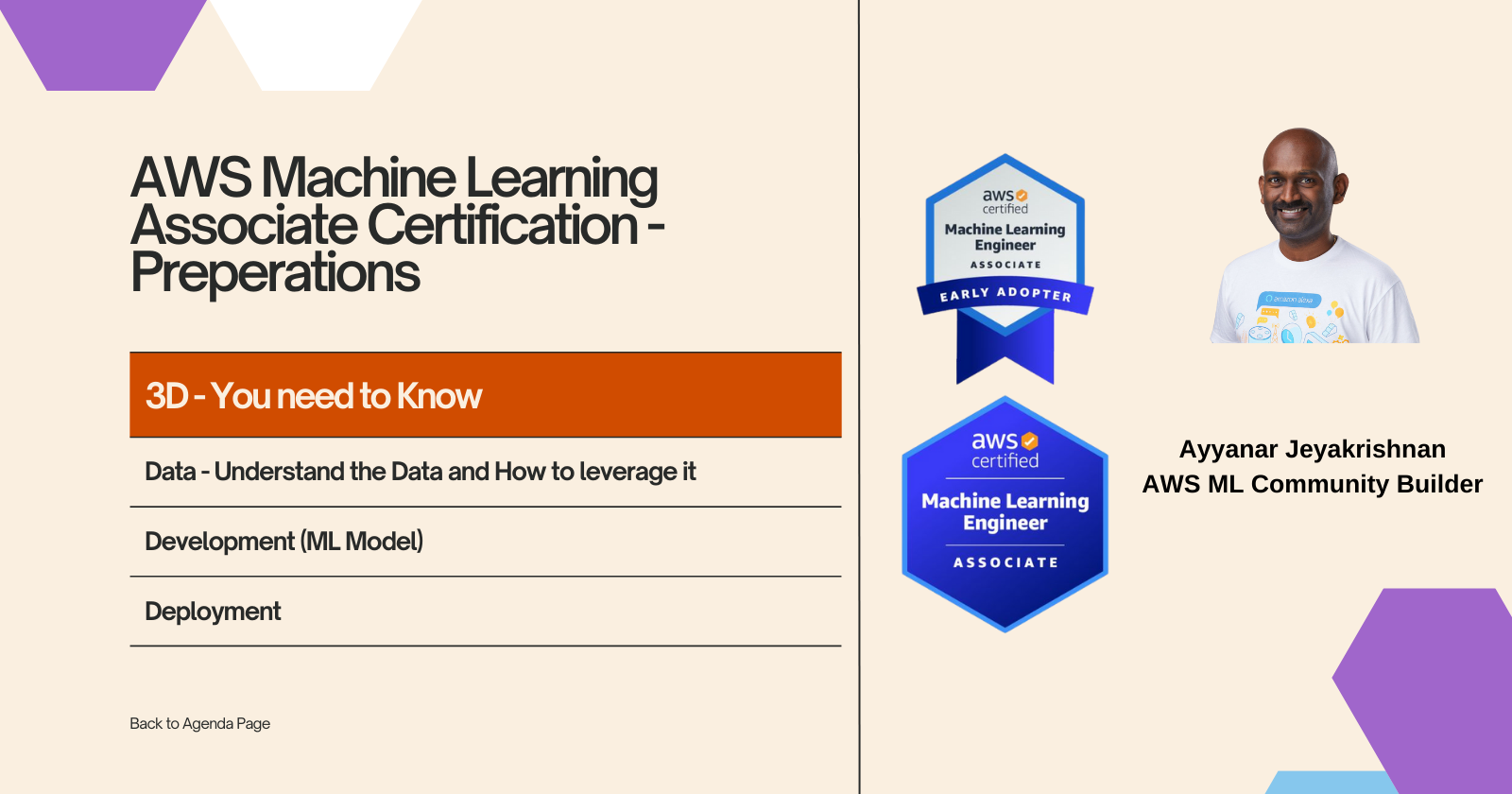Prepare your AWS Certified Machine Learning Associate Certification with the 3D: Data, Development (ML Model), and Deployment
 DataOps Labs
DataOps Labs
Introduction
The AWS Certified Machine Learning Engineer - Associate certification is more than just a credential; it's a reflection of your ability to create, manage, and deploy machine learning solutions leverage AWS Services in real-world settings. By focusing on the 3D Strategy—Data, Development (ML Model), Deployment—you can not only pass the exam but also gain valuable skills that are essential in today’s data-driven world.
Key Resources I Used
Here are some of the key resources that helped me prepare and succeed in this exam:
AWS SageMaker Workshops: Hands-on labs are crucial for gaining real-world experience. Practicing with SageMaker to train models and deploy them is vital for the exam.
AWS Power Hours:ML Engineer Associate: Developed by AWS experts, this series equips you with the skills and strategies to validate your technical proficiency in implementing machine learning workloads on AWS, positioning you for in-demand cloud ML roles.
Exam Guide and Practice Exams: The AWS ML Associate exam guide was my constant companion. It provided insights into the key domains and helped me focus my studies. Additionally, practice exams helped me assess my readiness.
AWS Skill Builder : AWS’s official training platform provided essential courses that covered all exam topics, from basic data preparation to advanced deployment strategies.
The 3D - You need to know for AWS MLA Certification Success
After earning this certification, I wanted to share my practical approach on my learning topics in simple Manner
These three pillars—Data Preparation, ML Model Development, and Deployment & Orchestration—form the foundation for success in the exam and in real-world ML projects. Whether you are looking to add to your existing AWS certifications or focusing on your first, this strategy will help you succeed.
1. Data Preparation for ML
The exam places significant importance on how well you handle data, and rightly so. AWS provides many tools and services for ingesting, transforming, and storing data.
Ingesting and Storing Data: Understand AWS data storage options like S3, Amazon EFS, and DynamoDB. AWS Kinesis and Apache Flink are crucial for streaming data, and you should know how to merge and process data using tools like Glue or SageMaker Data Wrangler, Data Brew.
Data Transformation and Feature Engineering: Cleaning and transforming your data is essential. Techniques such as scaling, encoding, and normalization are key topics for the exam. AWS Glue DataBrew and SageMaker Feature Store are your go-to tools for this.
Ensuring Data Integrity: Topics such as detecting biases, pre-training data validation, and compliance requirements are critical. You'll need to know how to mitigate bias using SageMaker Clarify and how to properly handle personally identifiable information (PII) in your datasets.
2. ML Model Development
Developing an effective model requires a deep understanding of both algorithm selection and training techniques.
Choosing the Right Modeling or AI Services Approach: SageMaker’s built-in algorithms, AI Services are your best friend here. You need to match the problem with the right model, whether it’s supervised learning or more complex foundation models with Amazon Bedrock.
Training Models: Hyperparameter tuning, regularization techniques, and preventing overfitting/underfitting are all areas you'll be tested on. SageMaker’s Automatic Model Tuning (AMT) is a powerful tool to master.
Evaluating Model Performance: Be familiar with common metrics like precision, recall, AUC, and confusion matrices. SageMaker Clarify helps identify biases in models, and SageMaker Debugger helps track model convergence.
3. Deployment and Orchestration
Deploying and orchestrating ML models in production environments is where the rubber meets the road.
Selecting Infrastructure: You must know how to choose the right compute resources for model deployment, whether it’s EC2, Lambda, or SageMaker endpoints. Batch and real-time inference are crucial topics to master.
Orchestrating Pipelines: Automating workflows using CI/CD pipelines is vital for production ML. AWS CodePipeline and SageMaker Pipelines allow you to automate training, testing, and deployment, which is a key skill for this exam.
Subscribe to my newsletter
Read articles from DataOps Labs directly inside your inbox. Subscribe to the newsletter, and don't miss out.
Written by

DataOps Labs
DataOps Labs
I'm Ayyanar Jeyakrishnan ; aka AJ. With over 18 years in IT, I'm a passionate Multi-Cloud Architect specialising in crafting scalable and efficient cloud solutions. I've successfully designed and implemented multi-cloud architectures for diverse organisations, harnessing AWS, Azure, and GCP. My track record includes delivering Machine Learning and Data Platform projects with a focus on high availability, security, and scalability. I'm a proponent of DevOps and MLOps methodologies, accelerating development and deployment. I actively engage with the tech community, sharing knowledge in sessions, conferences, and mentoring programs. Constantly learning and pursuing certifications, I provide cutting-edge solutions to drive success in the evolving cloud and AI/ML landscape.